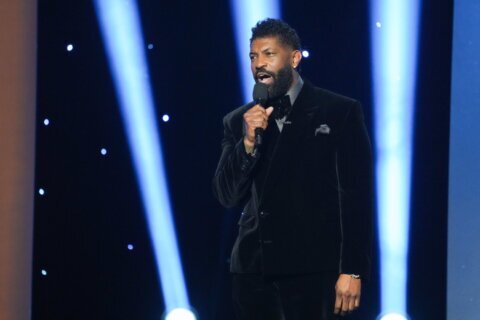During the pandemic, Blues Alley fans were concerned that the venue might close for good, but America’s oldest continually-operating jazz supper club is officially back open.
The historic Georgetown venue is presenting four weeks of shows four nights a week, from Thursdays to Sundays, as a sort of soft opening until national acts return in October.
“To paraphrase Mark Twain, rumors of our demise have been greatly exaggerated,” owner and executive director Harry Schnipper told WTOP.
Schnipper said NPR approached him during the pandemic and said, “We’ve heard a rumor that you might be closing.”
“I said, ‘I’m sorry, I don’t have anything to add,'” Schnipper recalled.
Former operations director Kris Ross told WTOP in February that the building was up for sale, but Ross was let go during the pandemic, leaving the venue’s owner to clarify.
“Until you hear it from Mr. Schnipper, it is not true,” Schnipper said. “The difference is the word ‘closed’ vs. ‘closing.’ We were closing because of a global pandemic; we did not close our business. … We’ve been very active for the last year and a half. We survived in light of the fact that COVID created certain difficulties. National acts weren’t really touring.”
Schnipper quickly pivoted to livestream shows filmed at the National Press Club, in partnership with the Voice of America, the United Nations, the Herbie Hancock Institute, the Ella Fitzgerald Foundation and more.
He said there were three reasons: He’s a member; the broadcast studios were vacant, and “I haven’t seen this much musical talent in D.C. in half a century, so I thought I would simply promote the local musicianship.”
In June, he also began hosting small in-person concerts at the National Press Club, building up to last weekend, when Blues Alley resumed in-person concerts at 50% capacity with Véronneau.
This weekend will feature “violin virtuoso” Dave Kline and his band, with guest vocals and harmonica from Virginia Sen. Tim Kaine; next weekend sees the jazz quartet of Michael Bowie and Marshall Keys with Federico Pena and Mark Prince. “Then, over the Columbus Day holiday weekend, we’ve got four wonderful vocalists,” Schnipper said.
A slate of renowned national acts arrive in October, including guitar virtuoso Stanley Jordan, R&B singer Jean Carne, seven-string guitarist John Pizzarelli, Latin jazz pianist Eddie Palmieri and South African vocalist and guitarist Jonathan Butler. “Then we continue to roll out performances, culminating on New Year’s with Jamaican pianist Monty Alexander,” Schnipper said.
Built in the 1800s, the old brick carriage house is located in an alley with a speakeasy vibe. It became a music club in 1965 with audiences right by the stage for an intimate feel. Even the dressing rooms are upstairs, so the artists have to walk through the crowd.
“We offer concert-sized performances in an intimate space that you share with others,” Schnipper said.
The atmosphere is the thing. “I believe that if these walls could talk, you’d hear half a century’s worth of stories from so many fabled artists who have performed here, from Ella Fitzgerald to Tony Bennett to Wynton Marsalis,” Schnipper said.
It’s the last vestige of the historic Georgetown music scene, outliving The Bayou, Cellar Door, Crazy Horse, The Saloon, Showboat Lounge and Gypsy Sally’s, which closed in late 2019. But Schnipper hopes for a post-pandemic resurgence of Georgetown activity.
“Georgetown was like Bourbon Street in New Orleans; you couldn’t roll a bowling ball without hitting one club after another,” Schnipper said. “I’m hoping this post-pandemic economic landscape will expand the number of venues.” He said he’s been talking to the D.C. government about “installing an arts overlay district to attract more operators to present live music.”
The website is under reconstruction, but you can still find a link to tickets or call 202-337-4141. Attendees must provide proof of vaccination or a recent negative test. Masks are required indoors. Schnipper hopes to be open five days a week in October, six in November and seven in December.
“Blues Alley has been totally refurbished,” Schnipper said. “We did all the plumbing and the electrical; we spent the summer upgrading our audio and video capabilities, and we have nothing but optimism going forward.”
Listen to our full conversation here.







